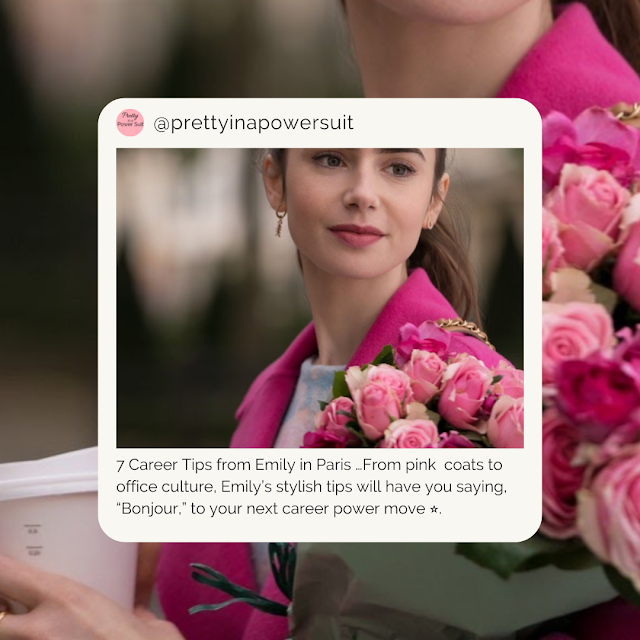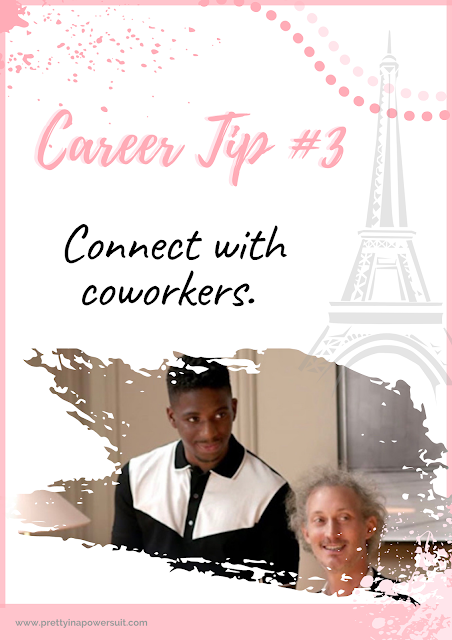Emily in Paris took Netflix viewers by storm as Emily galavanted around the City of Lights. The first season of the show offered a dose of glamour laced with giggles as Emily navigated the new city, French culture, relationships and working in a different country.
Beyond the amazing fashion and beautiful Parisian setting, the show offered plenty of real world career tips. Though you may not soon find yourself on the back of a Vespa with a cute Parisian while wearing couture, you can still take some of Emily’s work-ready advice.
Lesson 1: Fake it until you make it.
“I did Rosetta Stone on the plane, but it hasn’t kicked in yet.”
From the moment Emily lands in Paris, she is ready to embrace all her new job in Paris has to offer...even if she doesn’t know the language. Emily is thrown into an unexpected situation that she fully embraces, despite any learning curves.
Statistics cited by Harvard Business Review show that most women don’t apply to jobs unless they are 100% qualified, while men apply when they only meet 60% of the requirements. This holds women back from opportunities and career growth that impacts the trajectory of their entire career. Emily showcases how to succeed in a role, even when her skill set did not meet 100% of the qualifications on day one. The show is evidence of all the amazing things Emily would have missed out on if she turned down the opportunity for fear of being unqualified.
Lesson 2: Stay positive.
“I have some good news and I have some great news.”
Emily does not always have the easiest tasks at work. Whether it’s handling a crazy Hollywood starlet, managing the Vaga Jeune brand or being given seemingly impossible assignments by her skeptical boss, Emily stays positive regardless of the circumstances. She finds ways to spin what could be a negative outcomes into an opportunity for a new win.
Case in point, turning confusion over dinner reservations into a unique experience for her coworkers and a springboard for future business opportunities.
Not only does positivity make someone more pleasant to be around or lead to success as it did for Emily, it can also make for a healthier life. Studies by Mental Health National have shown that pessimistic people had a 20% higher likelihood of dying. That’s reason enough to take a cue from Emily!
Lesson 3: Connect with coworkers.
“You live to work. We work to live.”
Emily’s French coworkers are not her biggest fans when she first arrives to the office. Not only does Emily not know the language, the cultural differences between her American approach and their French ways often clash. Personal, cultural and experiential differences can cause misunderstandings and disagreements at work.
Emily connects with each coworker on an individual level to help build relationships. Whether it’s demonstrating grace with Sylvie or humor with Julien and Luc, Emily showcases the power of connecting with coworkers.
Not only is this important for the success of work outcomes, having friends at work helps you stay connected with your job. A study by Gallup found that those with a best friend at work are 7 times more likely to be engaged at work. This study shows that Emily was on to something important as she pursued positive relationships with those at work.
Lesson 4: Know your results.
“In fact Merck was one of our biggest clients. They make a diabetes drug that we marketed the heck out of. Sales went up 63%.”
Emily is ready to back up her confidence with tangible results without a moment’s notice. She is quick to share her successful marketing outcomes with her new French colleagues. Why is this important? For Emily, it helped her new coworkers understand her background and skill set, even if they rolled their eyes in the process.
For you, it can help establish your credibility. Of course there is a time and place to discuss numbers and results, but knowing what you’ve done well is always a good idea. Your past results can serve as a starting point for your next project and help propel you forward into whatever project comes next.
Lesson 5: Learn the culture, rituals and routines.
“We’re at a soiree, not a conference call.”
Moving to a new country and taking on a new role at work would be a big change for anyone. Emily experiences the confusion, awkward moments and miscommunications of being a transplant into a new culture. With any environment, whether it’s going to an entirely new country, new company or even to a new department at work, there are going to be cultural shifts. It’s important to take note of the language, culture, rituals and routines that make up the day-to-day operations. The spoken and unspoken signals can help paint a picture of how to make a successful transition into your new environment.
Lesson 6: Find ways to re-negotiate.
“Let’s not get caught up on vowels. It’s about all of us sharing a global vision.”
Negotiation is a part of work and life. Big and small negotiations are inevitable as we navigate interactions with other people. Emily shows the power of finding common ground, even when it seems like the differences are too large. As the American representative in the newly acquired French office, Emily is in a position to bridge the two companies and cultures. She experiences the resistance and backlash from the French office when communication is mishandled by the American company. Even when communication initially fails, negotiations can bring positive resolutions.
For any of us, finding ways to re-negotiate even when obstacles first appear is not always a straightforward path. But as Emily demonstrates, using other lessons like positivity, connecting with coworkers and learning the environment can help the communication and negotiation go more smoothly.
Lesson 7: Stay authentic.
“How about you do you and I’ll do me.”
As Emily struggles to connect with her boss, as well as other coworkers, she could easily succumb to the pressure to settle into the role they are trying to define for her. But this would be a disservice to what Emily is truly capable of accomplishing. Instead, Emily continues to stay true to herself, even when it’s challenging and she is being treated like an outsider. She maintains her worth and value, which then empowers her to deliver top notch results in her role and pursue opportunities without compromise.
Not sure how to channel the confidence and authenticity of Emily? Take some advice from social psychologist Amy Cuddy and her study of power and presence. By first knowing your own values, beliefs and abilities, you’ll have the foundation to succeed in even the most stressful situations.
Still need an extra boost? Take a look at Amy’s TED Talk about body language and presence.
Original image of Amy via Richtopia

















